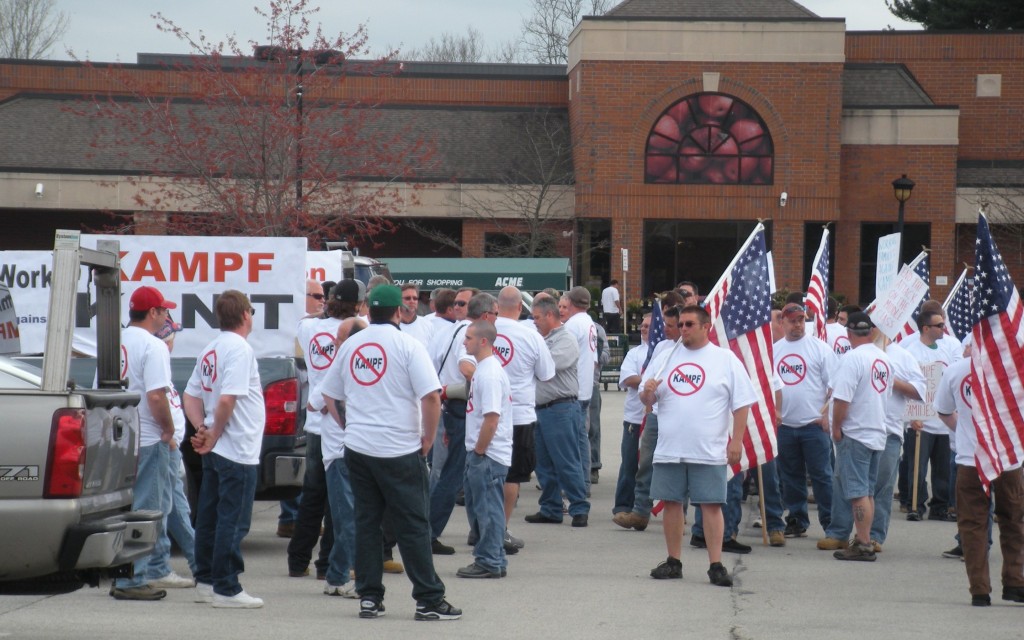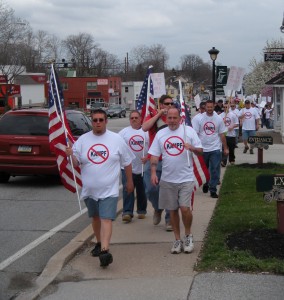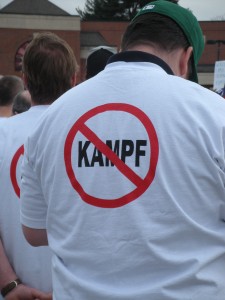Anyone that follows Community Matters knows that I am a Wegmans fan but after my experience yesterday, I may find myself shopping at the Acme in Paoli more often.
 Around 3 PM on Wednesday, as I left Acme there was a large organized group of men in the parking lot changing into identical white t-shirts, many with signs and American flags. As I got closer, I could see several pick-up trucks with signage with anti-Warren Kampf messages – ‘Working Families Against Kampf’, ‘Kampf Works Against Workers’, etc. Clueless as to whom these people were and what they were doing, I asked and was told that they were members of Pennsylvania’s Carpenter’s Union and they were ‘taking their message’ to State Rep Warren Kampf’s office in Paoli.
Around 3 PM on Wednesday, as I left Acme there was a large organized group of men in the parking lot changing into identical white t-shirts, many with signs and American flags. As I got closer, I could see several pick-up trucks with signage with anti-Warren Kampf messages – ‘Working Families Against Kampf’, ‘Kampf Works Against Workers’, etc. Clueless as to whom these people were and what they were doing, I asked and was told that they were members of Pennsylvania’s Carpenter’s Union and they were ‘taking their message’ to State Rep Warren Kampf’s office in Paoli.
 I was far from clear on exactly what the union members ‘message’ was, but … frankly, I had the distinct impression that these people had a mission and that they were not particularly interested in engaging in conversation. It is not everyday that there is a long line of union picketers walking along Lancaster Avenue, and I decided that if I followed them, that I would eventually figure it out.
I was far from clear on exactly what the union members ‘message’ was, but … frankly, I had the distinct impression that these people had a mission and that they were not particularly interested in engaging in conversation. It is not everyday that there is a long line of union picketers walking along Lancaster Avenue, and I decided that if I followed them, that I would eventually figure it out.
By the time the large group of 85-100 arrived at the door to Warren Kampf’s office,Lancaster Avenue and Darby Road was filled with honking motorists showing their support. Slowly circling the Paoli streets, each of the accompanying pick-up trucks had amplifiers loudly broadcasting pro-union, anti-Kampf commentary.
OK, I finally figured out the mission of these union representatives and the purpose of their afternoon rally in Paoli — PA House Bill 709. Rep Kampf sponsored HB 709, which eliminates school districts from the coverage of the Prevailing Wage Act. The passage of the bill would allow an individual school district to vote to pay its contractors a prevailing wage if a school board wishes to do so.
In early 2011, Kampf introduced “School Construction Cost Reduction Act” (HB 709) to reduce costs for school districts by exempting them from the state’s prevailing wage requirements. Kampf explained his proposed reform legislation in his 2011 summer newsletter, in an article titled “My Prevailing WAGE reform” stating,
“Forcing them [school districts] to pay an inflated rate for public contracts is both fiscally unwise and burdensome to taxpayers, particularly to those on fixed incomes who face annual increases in property taxes. Prevailing wage rules require public agencies to pay contractors a wage set by bureaucrats, which usually equals the local union rate. In some cases, that inflates wages well above what that contractor’s work is worth in a particular location.
My bill would exempt school districts as a public entity required by state law to pay prevailing wages. It allows individual school districts to vote to pay their contractors a prevailing wage if they wish to. Requiring our public agencies to pay higher wages makes no sense, especially at a time of financial hardship. School districts are struggling to balance their budgets. Forcing them to pay wages to contractors well above what the private sector pays places an excessive burden on schools and taxpayers. This must change.”
Although tabled last fall, according to the PA State House calendar, the proposed HB 709 legislation is coming off the table and is scheduled for discussion by state legislators on Monday, March 26.
Understanding the financial crisis that school districts across the state are now in, it is certainly plausible that the proposed HB 709 legislation that could help by saving district’s money. On the other hand, is there a risk that this prevailing wage reform bill could result in work performed by undertrained, non-union contractors that could potentially result in higher long-term costs to the school districts? The opposing views on this issue do not appear to be as simple as a ‘pro versus anti-union’ argument.
 From what I surmised by the picketing Carpenter Union workers, they are of the mind that changing the prevailing wages laws does nothing more than increase the challenge and burden for union workers and their families. But how does that argument weigh against the possible savings to school districts (taxpayers) … and could one additionally argue that prevailing wage reform could create more jobs because school districts would be able to stretch their money further and spend money on more projects would have gone to wages?
From what I surmised by the picketing Carpenter Union workers, they are of the mind that changing the prevailing wages laws does nothing more than increase the challenge and burden for union workers and their families. But how does that argument weigh against the possible savings to school districts (taxpayers) … and could one additionally argue that prevailing wage reform could create more jobs because school districts would be able to stretch their money further and spend money on more projects would have gone to wages?
I can see both sides of this argument – possible cost-savings to school districts in an economic climate of great need versus the hardship that could be placed on union workers and their families in a time when jobs are difficult to find.
——————————————————————————————-
For a 45 second YouTube video, click here – Carpenter’s Union Protest in Paoli .
Click here to read PA House Bill 709.
——————————————————————————————-
Has this winter left you suffering from cabin fever and a need to get outside for some fresh air? There’s a perfect opportunity this Saturday, April 14 to help the community and celebrate the end of winter!
 is 88 acres of meadows, woods, ponds, stream, and extensive trail system are managed to provide a variety of habitats for wildlife in a beautiful rural setting.
is 88 acres of meadows, woods, ponds, stream, and extensive trail system are managed to provide a variety of habitats for wildlife in a beautiful rural setting. Any questions, contact Ray Clarke at 610-578-0358.
Any questions, contact Ray Clarke at 610-578-0358.

